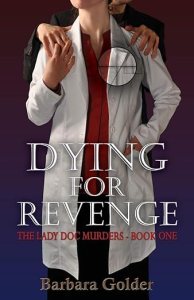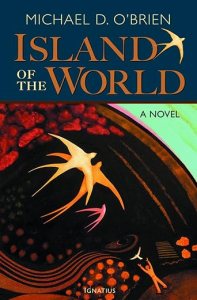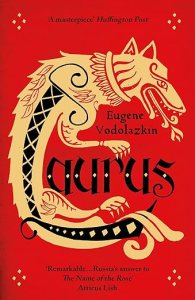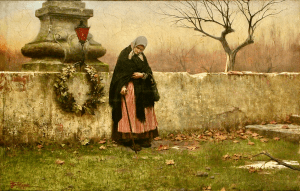We support our Publishers and Content Creators. You can view this story on their website by CLICKING HERE.
For many years I’ve been teaching online courses for Red Cultural in Chile. During last week’s session of a course on “Literary Converts”, based on my book of that title, I was asked whether there are still good works of literature being written today. I replied effusively in the affirmative. I was then asked whether I could come up with a list of novels written in the twenty-first century which are worth reading. Thus inspired, and rising to the challenge, here’s a list of fifteen favourites, all of which I’ve read and enjoyed and all of which have been published since the turn of the millennium.
Listing the novels alphabetically by author, thereby avoiding the stress of trying to place them in any order of preference, the first of my favourites is Bearings and Distances by Glenn Arbery (Wiseblood Books, 2015). Set in the contemporary American South, this is a gritty and gruesome revelation of the destructive reality of the culture of death. It is painful to read because it exposes nihilism’s raw nerve. It is not for the squeamish and will make the reader squirm. It is an uncompromisingly realistic portrayal of the sheer selfishness and ugliness of pride. It looks postmodernity in the eye and stares it down.
Third and fourth on the list are two titles by the same author, Antonia Arslan, both of which are selected because I couldn’t choose between them. Skylark Farm (Vintage Books, 2007) and Silent Angel (Ignatius Press, 2020) are both historical novels set during the time of the Armenian Genocide. The first depicts the horrific death march of Armenian women and children and the second tells the inspiring story of how a small group of Armenians escaped from the genocide, saving a priceless mediaeval illuminated manuscript by carrying it with them, like a cross, on their own via dolorosa.
The Beast of Bethulia Park by S. P. Caldwell (Gracewing, 2022) is a thriller set against the backdrop of Britain’s healthcare system in which a psychopathic and sexually depraved physician conceals his systematic killing or “culling” of elderly patients behind layers of bureaucracy. As the families of the deceased become suspicious, a young and idealistic priest finds himself dragged into a dangerous world of murderous mystery.
Any of the novels of Fiorella de Maria could have made it to the list of favourites but I’ve selected the novel she co-wrote with K. V. Turley. This Thing of Darkness (Ignatius Press, 2021) is set in Hollywood in the 1950s. A young journalist, grieving the loss of her husband, is sucked into the darkly morbid and dangerously macabre presence of the aging actor, Bela Lugosi, who seems to be possessed by the character of Count Dracula, whom he’d played so successfully more than twenty years earlier. Fading and forgotten, Lugosi lives in his own past, both real and imagined, playing mind games with the vulnerable young woman who is interviewing him. Possessed himself by his own abandonment to the dark side, Lugosi seeks to possess the mind of his interlocutor.
The Awakening of Miss Prim by Natalia Sanmartin Fenollera (Atria Books, 2014) is altogether lighter than most of the other fare on the list. It is lighter in the sense that it is breezier, offering the fresh air of a fresh perspective, but also in the sense that it penetrates the murk of modernity with the light of grace and with the transcendental splendour of the good, true and beautiful. The eponymous heroine is awakened from the relativism that she had embraced unthinkingly when she arrives at an isolated village in which the inhabitants embrace the goodness of life with eyes wide open with wonder. As her own eyes open, she casts off her self-deceptive feminist prejudices and flowers into the fullness of feminine faith and fortitude.
 Dying for Revenge, the first in the series of “Lady Doc Murders” by Barbara Golder (FQ Publishing, 2016), introduces the reader to Dr. Jane Wallace, a medical examiner struggling with loneliness following the death of her husband, who finds herself at the forefront of the hunt for a serial killer. Among the suspects are the local chief of police and the local parish priest, the latter of whom is Dr. Wallace’s friend. Like all good murder mysteries, Dying for Revenge keeps the reader guessing until the final pages.
Dying for Revenge, the first in the series of “Lady Doc Murders” by Barbara Golder (FQ Publishing, 2016), introduces the reader to Dr. Jane Wallace, a medical examiner struggling with loneliness following the death of her husband, who finds herself at the forefront of the hunt for a serial killer. Among the suspects are the local chief of police and the local parish priest, the latter of whom is Dr. Wallace’s friend. Like all good murder mysteries, Dying for Revenge keeps the reader guessing until the final pages.
If You Can Get It by Brendan Hodge (Ignatius Press, 2020) follows the experience of two sisters, whose lives converge even as their own outlooks on life initially diverge radically. One is a highly successful career woman in Silicon Valley, the other a recent college graduate with no clear idea of her goals in life. One sister flies off on a business trip to China while the other works at Starbucks. At its healthy heart, this thought-provoking novel questions contemporary notions of worldly success and suggests that true happiness is to be found closer to home.
Treason by Dena Hunt (Sophia Institute Press, 2013) is an historical novel set in the bloody reign of Elizabeth I, at a time when it was punishable by death to be a Catholic priest and punishable by death to hide a priest from the government’s priest-hunters. Reminiscent of the historical novels set in the same period by R. H. Benson, such as Come Rack! Come Rope!, Treason is one of the most powerful historical novels I‘ve ever read. It brings to vivid and shocking life the age in which Shakespeare lived and in which the English martyrs died.
A Bloody Habit by Eleanor Bourg Nicholson (Ignatius Press, 2018) is a literary novel which gently parodies Victorian gothic fiction, baptizing it with Catholic theology and introducing into it a Dominican priest as a Thomistic vampire hunter. Written with stylized flourish reflecting the classics of the gothic genre, it will appeal to those who love the Victorian age in literature.
 Any of the novels of Michael D. O’Brien warrant a place on this list. The best-known, arguably the best, and possibly my favourite, is Father Elijah. Since, however, this was published in the 1990s it doesn’t qualify for this listing of twenty-first century fiction. The best of the rest might be Island of the World (Ignatius Press, 2007), a monumental tome weighing in at 839 pages. Set against the backdrop of the Second World War and its aftermath, the novel takes place in the volatile culture of the Balkans in which Islam meets with both Orthodox and Catholic Christianity in a melting pot on the point of melting down.
Any of the novels of Michael D. O’Brien warrant a place on this list. The best-known, arguably the best, and possibly my favourite, is Father Elijah. Since, however, this was published in the 1990s it doesn’t qualify for this listing of twenty-first century fiction. The best of the rest might be Island of the World (Ignatius Press, 2007), a monumental tome weighing in at 839 pages. Set against the backdrop of the Second World War and its aftermath, the novel takes place in the volatile culture of the Balkans in which Islam meets with both Orthodox and Catholic Christianity in a melting pot on the point of melting down.
Compared with the gravitas of O’Brien’s political and theological epic, The Book of Jotham by Arthur Powers (Tuscany Press, 2013) is positively sylphlike in its levity and brevity. A novella of only a few dozen pages, it is the story of Jotham, a mentally disabled disciple of Christ, probably gifted with Down syndrome, who sees the life of Christ with the eyes of simplicity reserved for the Holy Fool.
Declare by Tim Powers (Subterranean Press, 2000) is my favourite of the several books that I’ve read by this quirkily original writer who is best-known for his novel On Stranger Tides, which was the inspiration for The Pirates of the Caribbean movie series. The weirdness of those films will offer some inkling of the weirdness of Powers’ other works. Unlike On Stranger Tides, Declare is not set in the piratical past but in the more recent past of the past century. Straddling the turbulent period from the Spanish Civil War, World War Two and the Cold War that followed, it is a spy adventure on the surface which seethes with the supernatural and the demonic under the surface, and, indeed, occasionally on the surface when the preternatural powers gatecrash the natural world. Powers is not merely a consummate storyteller of the first and finest order but is a committed Catholic. The latter is evident in his novels, elusively and allusively, in the presence of barely perceived and often ignored grace.
Unlike most of the titles on this list, Declare was a bestseller, as was A Gentleman in Moscow by Amor Towles (Viking Penguin, 2016), our penultimate selection. As the title proclaims, the novel is set in Moscow in the decades immediately following the Russian Revolution, during which the eponymous gentleman, as “an enemy of the state”, is confined to the hotel in which he resides shortly after the Russian Revolution. If he steps over the threshold into the streets beyond the walls of his place of relatively comfortable imprisonment, he will be arrested and shot. The novel shows how the prisoner of the state retains his civility and his commitment to civilization in the midst of, and in spite of, the barbarism of the Soviet Union.
 And so to the final title of the fifteen favourites. This is Laurus by Eugene Vodolazkin (Oneworld Publications, 2015), a work originally published in Russia in 2012. Set in that country during the plague-ridden fifteenth century, it follows the spiritual progress of a holy fool and Christian mystic who possesses great healing powers. It tells of his pilgrimage through life, en route no doubt to heaven, in which he learns from the excruciating mistakes of his youth, and the sufferings of a life of voluntary fasting and poverty, to accept and embrace the will of Christ. It is a masterpiece of mysticism.
And so to the final title of the fifteen favourites. This is Laurus by Eugene Vodolazkin (Oneworld Publications, 2015), a work originally published in Russia in 2012. Set in that country during the plague-ridden fifteenth century, it follows the spiritual progress of a holy fool and Christian mystic who possesses great healing powers. It tells of his pilgrimage through life, en route no doubt to heaven, in which he learns from the excruciating mistakes of his youth, and the sufferings of a life of voluntary fasting and poverty, to accept and embrace the will of Christ. It is a masterpiece of mysticism.
As one who believes in the tradition of the Great Books and the Great Conversation that they inspire, I believe that books, like saints, should not be canonized hastily. Usually, as a rule of thumb, I advocate that at least fifty years should have elapsed from the time of first publication before a work can be considered canonical. That being said, and wishing to practice what I preach, I’m not canonizing any of these contemporary favourites. I would say, however, that I am pleased to have read these novels and am happy to recommend them to others.
The Imaginative Conservative applies the principle of appreciation to the discussion of culture and politics—we approach dialogue with magnanimity rather than with mere civility. Will you help us remain a refreshing oasis in the increasingly contentious arena of modern discourse? Please consider donating now.

 Conservative
Conservative  Search
Search Trending
Trending Current News
Current News 





